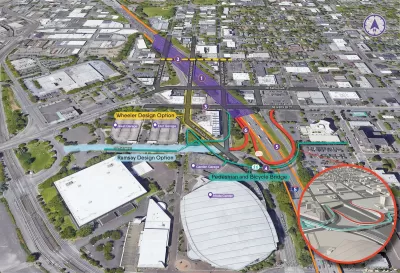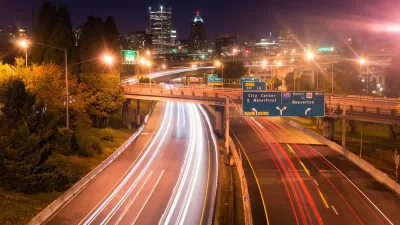The Oregon DOT is requesting a federal grant to fund a controversial freeway expansion through the Rose Quarter.

Environmental and sustainable transportation advocates in Portland, Oregon are urging federal officials to oppose a proposed expansion of the Interstate 5 freeway through the city’s Rose Quarter.
A grant being considered by the U.S. Department of Transportation (USDOT) could “make or break” the project, according to an article by Taylor Griggs in the Portland Mercury. “Freeway expansion opponents argue ODOT has concealed the true environmental costs of the Rose Quarter project in order to present it as a sustainable and equitable investment in Portland’s future. But their opposition to the grant award puts them at odds with local government officials and several community organizations, who have also written USDOT with letters of support.”
ODOT’s current plan involves new auxiliary lanes in both directions of the freeway. After years of backlash, the department agreed to sink the freeway and add new surface connections above. “ODOT says the cover will be able to support residential and commercial buildings, and will make it easier for people walking, biking, or rolling to get around. The project also includes a plan to build a pedestrian and bicycle bridge over I-5 near the Moda Center.”
Although it received a $450 million Reconnecting Communities grant, the cap plan, developed with “strong input” from community advocates, is largely unfunded and could cost up to $1.9 billion.
Advocates including Joe Cortright and Chris Smith, founders of No More Freeways, recommend that USDOT award a smaller, $400 million grant geared toward completing a proposed pedestrian and bike bridge. In a letter, Cortright and Smith said “the project is engineered to be vastly wider than needed,” doubling the width of the freeway. “Ultimately, advocates from groups like No More Freeways say the RCN program cannot coexist with a USDOT that doles out federal funding to polluting, harmful freeway expansions.”

Planetizen Federal Action Tracker
A weekly monitor of how Trump’s orders and actions are impacting planners and planning in America.

Congressman Proposes Bill to Rename DC Metro “Trump Train”
The Make Autorail Great Again Act would withhold federal funding to the system until the Washington Metropolitan Area Transit Authority (WMATA), rebrands as the Washington Metropolitan Authority for Greater Access (WMAGA).

The Simple Legislative Tool Transforming Vacant Downtowns
In California, Michigan and Georgia, an easy win is bringing dollars — and delight — back to city centers.

In These Cities, Most New Housing is Under 441 Square Feet
With loosened restrictions on “micro-housing,” tiny units now make up as much as 66% of newly constructed housing.

Albuquerque’s Microtransit: A Planner’s Answer to Food Access Gaps
New microtransit vans in Albuquerque aim to close food access gaps by linking low-income areas to grocery stores, cutting travel times by 30 percent and offering planners a scalable model for equity-focused transit.

This City Will Pay You to Meet Your Neighbors
A North Kansas City grant program offers up to $400 for residents to throw neighborhood block parties.
Urban Design for Planners 1: Software Tools
This six-course series explores essential urban design concepts using open source software and equips planners with the tools they need to participate fully in the urban design process.
Planning for Universal Design
Learn the tools for implementing Universal Design in planning regulations.
Smith Gee Studio
City of Charlotte
City of Camden Redevelopment Agency
City of Astoria
Transportation Research & Education Center (TREC) at Portland State University
US High Speed Rail Association
City of Camden Redevelopment Agency
Municipality of Princeton (NJ)





























